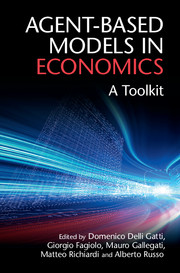Book contents
- Frontmatter
- Dedication
- Contents
- List of Figures
- List of Tables
- List of Contributors
- Preface
- 1 Introduction
- 2 Agent-Based Computational Economics: What, Why, When
- 3 Agent-Based Models as Recursive Systems
- 4 Rationality, Behavior, and Expectations
- 5 Agents’ Behavior and Learning
- 6 Interaction
- 7 The Agent-Based Experiment
- 8 Empirical Validation of Agent-Based Models
- 9 Estimation of Agent-Based Models
- 10 Epilogue
- Bibliography
- Index
6 - Interaction
Published online by Cambridge University Press: 02 March 2018
- Frontmatter
- Dedication
- Contents
- List of Figures
- List of Tables
- List of Contributors
- Preface
- 1 Introduction
- 2 Agent-Based Computational Economics: What, Why, When
- 3 Agent-Based Models as Recursive Systems
- 4 Rationality, Behavior, and Expectations
- 5 Agents’ Behavior and Learning
- 6 Interaction
- 7 The Agent-Based Experiment
- 8 Empirical Validation of Agent-Based Models
- 9 Estimation of Agent-Based Models
- 10 Epilogue
- Bibliography
- Index
Summary
Introduction
It is a fact of life that the preferences, information, and choices – hence the behavior – of an agent affect and are affected by the behavior of the agents she interacts with. In fact, there is a two-way feedback between individual and aggregate behavior: agents’ interaction affects the evolution of the system as a whole; at the same time, the collective dynamics that shape the social structure of the economy affect individual behavior.
For example, consider the case of the adoption of a new technology by initially uninformed consumers. Each agent, based on her preferences, may have some ex-ante evaluation about the quality of new products introduced in the market. However, by interacting with their peers, agents may gather fresh information about the new product and, eventually, they may decide whether to buy it or not. This influences the adoption rate of the product, which can be in turn exploited by other consumers as a parameter to be employed when subsequently considering whether to buy the product or not. Therefore, individual decisions may be affected by agent interactions, then impact on the aggregate state of the system, which can in turn feed back to individual behaviors.
Traditionally, economic theory has largely overlooked the importance of interactions among economic agents. In standard economic theory, interactions are treated as externalities or spillovers. In general equilibrium theory (GET), the presence of externalities is often treated as a pathology of the model, leading to possible nonexistence of equilibria. Therefore, in the model it is often assumed that externalities do not simply exist – i.e., that agents only interact indirectly through a nonagent – that is prices, whose role is to aggregate individual information. Hence, in GET, agents are totally disconnected, dots living in a vacuum without any connections (links) between them.
To appreciate the importance of externalities in mainstream economics, one has to resort to game theoretic models. In this setup, agents interact directly with all the other agents in the game. Interactions are captured via strategic complementarities: the payoff of any single agent depends directly on the choices made in the game by all the N − 1 other agents. This configures a scenario completely at odds with the one portrayed in GET, namely one where agents live in a fully connected world, where they are linked with anyone else.
- Type
- Chapter
- Information
- Agent-Based Models in EconomicsA Toolkit, pp. 109 - 142Publisher: Cambridge University PressPrint publication year: 2018

